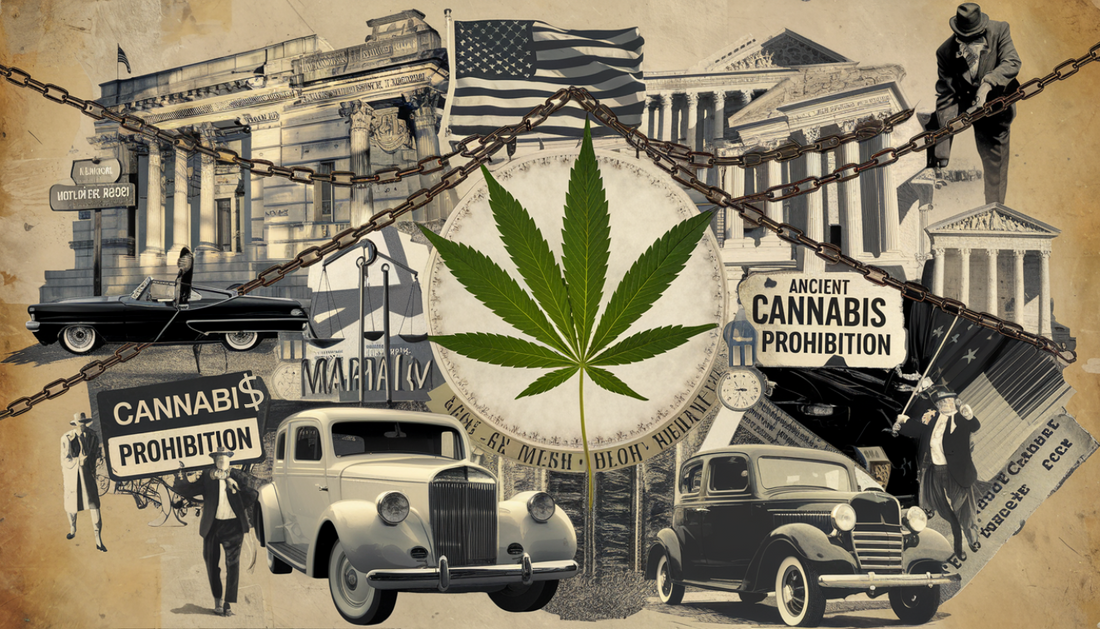
Why and How Cannabis Became Illegal: A Historical, Social, and Political Analysis
Stephan RichFor centuries, cannabis has been used in various cultures for its medicinal, spiritual, and industrial properties. Yet, it remains illegal in much of the world. Why has this plant—once considered a universal remedy and an invaluable economic resource—been criminalized? This article explores the origins, reasons, and impacts of cannabis prohibition while discussing future prospects as legalization gains momentum worldwide.
A Historical Overview: From Beneficial Plant to Prohibited Substance
Cannabis in Antiquity and the Middle Ages
For millennia, cannabis was widely utilized across civilizations. In China, its fibers were used to make textiles and paper, while its seeds and resin were valued in medicine. In India, cannabis was considered sacred and consumed as bhang in spiritual rituals.
In Europe, hemp was an essential crop until the 19th century, used for making ropes, sails, and even banknotes. It was also prescribed as medicine in many Western countries.
The Turning Point of the 20th Century
Cannabis prohibition took root in the early 20th century, fueled by several factors:
- Racial and cultural influences: In the United States, cannabis was associated with Mexican immigrants and African Americans, reinforcing racial biases and justifying its prohibition. Media campaigns, often biased, portrayed cannabis as a dangerous, violence-inducing drug.
- Industrial lobbying: With the rise of new industries like plastics, cotton, and pharmaceuticals, hemp, which was cheap and versatile, became a threat to major corporations. Influential figures like Harry Anslinger played a central role in demonizing cannabis.
In 1937, the U.S. enacted the Marihuana Tax Act, a law that laid the foundation for global cannabis prohibition. This trend spread through international agreements, such as the 1961 Single Convention on Narcotic Drugs, which classified cannabis as a dangerous drug.
Why Does Cannabis Remain Illegal Today?
Despite scientific advances and legalization efforts in some countries, many governments continue to uphold cannabis prohibition. The reasons are varied:
-
A Legacy of Stigmatization
The negative perception of cannabis, rooted in decades of propaganda, remains a significant barrier. Many still associate the plant with delinquency, even as this image is increasingly challenged. -
Economic Interests
Pharmaceutical industries are often accused of slowing cannabis legalization, as its medicinal properties could compete with lucrative medications.|The black market, although illegal, generates billions of dollars, benefiting certain criminal organizations. -
Legislative Complexity
Regulating the production, sale, and use of cannabis requires robust legal frameworks. Some governments fear challenges related to preventing abuse, protecting minors, and implementing taxation.
The Impacts of Prohibition
On Society
Cannabis criminalization has led to:
- Mass incarcerations, particularly among marginalized populations.
- Stigmatization of users, even in medical contexts.
- The perpetuation of an unregulated black market, fostering violence and organized crime.
On the Economy
Prohibition prevents the economic potential of the plant from being fully realized, particularly in health, wellness, agriculture, and textiles.
On Scientific Research
For decades, prohibition has hindered studies on cannabis, limiting our understanding of its effects and therapeutic potential.
Towards Legalization: A Growing Revolution
Despite these obstacles, a global wave of legalization is gaining momentum. Countries like Canada, Uruguay, and several U.S. states have demonstrated that regulating cannabis can be beneficial. The results include:
- A reduction in drug-related arrests.
- Increased tax revenue from legal sales.
- Greater access to cannabis-based medical treatments.
Additionally, attitudes are shifting: younger generations and healthcare professionals are increasingly advocating for an approach based on science and human rights.
Why Reconsider Prohibition?
- Proven Medical Benefits: Cannabis is used to treat conditions such as epilepsy, chronic pain, and anxiety disorders. Medical legalization could improve the quality of life for millions of patients.
- Huge Economic Potential: Regulating cannabis could create thousands of jobs while providing a significant source of tax revenue for governments.
- Necessary Social Justice: Decriminalization would reduce inequalities, particularly in communities affected by harsh drug policies.
Conclusion: Cannabis, From the Shadows to the Spotlight?
The history of cannabis prohibition is a mix of misinformation, discrimination, and economic interests. However, the tide is turning. As scientific evidence mounts and the social and economic benefits of legalization become clear, the world could be entering a new era where cannabis is no longer seen as a threat but as an opportunity.
The question is no longer "if" but "when" cannabis will be widely accepted. As attitudes evolve, it is essential to continue educating, raising awareness, and advocating for responsible and ethical regulation.
Sources :
- National Library of Medicinal : Medicinal Cannabis: History, Pharmacology, And Implications for the Acute Care Setting
- Harvard Health Publishing : Medical Marijuana
